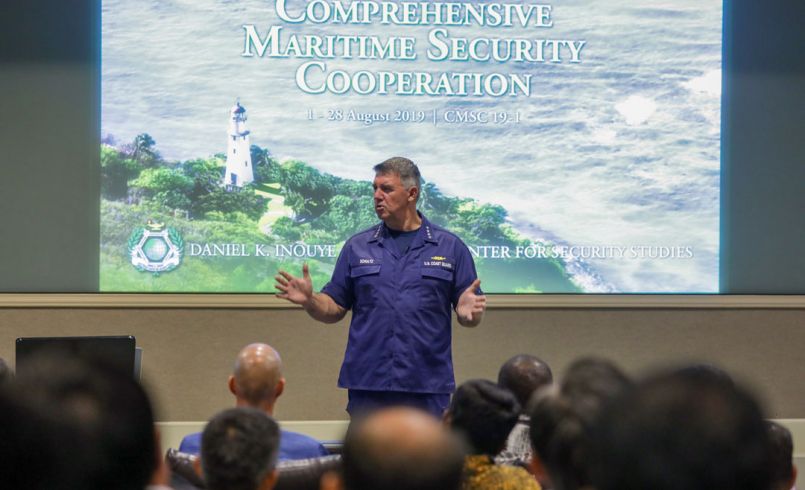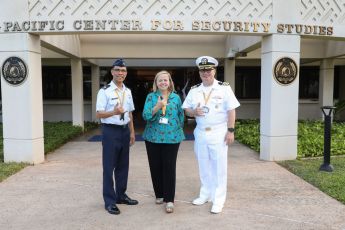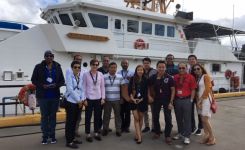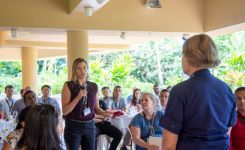- Daniel K. Inouye Asia-Pacific Center for Securi...
- DKI APCSS expands maritime security efforts wit...
DKI APCSS expands maritime security efforts with inaugural course
4t2a6759-keynote.jpg

The Daniel K. Inouye Asia-Pacific Center for Security Studies (DKI APCSS) in Honolulu, hosted its inaugural Comprehensive Maritime Security Cooperation (CMSC 19-1) Course from Aug. 1-28, 2019.
Ninety-six participants from 31 locations and 10 non-governmental, international and regional organizations completed the newly-designed course. Countries or locations represented were Australia, Bangladesh, Cambodia, Fiji, Indonesia, Laos, Malaysia, Marshall Islands, Mongolia, Myanmar, Nepal, New Zealand, Papua New Guinea, Philippines, Republic of Korea, Sri Lanka, Thailand, Tonga, the U.S. and Vietnam.
This four-week course was designed to advance the knowledge, skills, and networks of officials across the Indo-Pacific region who intersect with the maritime domain from a variety of security perspectives including economics, trade, transnational threats, environment and food security.
CMSC 19-1 was distinguished from other maritime course offerings by the diversity of its participants. According to course manager Dr. Lori Forman, “CMSC underscored the need for the maritime security community to think more broadly about the relationships necessary to address today’s increasingly complex maritime security challenges and promote a free and open Indo-Pacific.”
The course also featured 10 Fellows Project cohorts: national or multi-national groups of Fellows specifically recruited to work together on a maritime security challenge facing their country or region. Five of these cohorts worked on their national plans for improving maritime domain awareness and interagency information sharing in their country, while the others worked on topics identified in advance such as improving port security, reducing drug trafficking by sea and establishing a national coast guard. Nearly half of the Fellows worked in cohorts, while 46 Fellows undertook individual Fellows Projects.
“Human interaction is the key,” said CMSC 19-1 Fellow Ms. Noor Shifrah Binti Md Nadzry, Malaysia National Security Council. “Throughout the four week expanse of the course, the interactions are there, every day, from plenary, from seminar sessions, from simulations as well as during lunch. We interact with each other on (a) daily basis. From that interaction, it builds trust and relationships. We form a bond and the richness of discussion coming from a myriad of different backgrounds, cultures and perspectives. “
DKI APCSS leadership was honored to have Adm. Karl Schultz, Commandant of the U.S. Coast Guard, deliver a keynote address. Adm. Schultz spoke about the link between defense and law enforcement approaches to maritime security, a concept many nations are struggling to implement. His message of inter-agency cooperation in support of respective missions, combined with international cooperation, seemed to resonate with the Fellows.
Other plenary speakers included Rear Adm. Robert Hayes Joint Interagency Task Force, West (JIATF-W), Capt. Vivanne Louie (U.S. Coast Guard Activities Far East), Mr. Brian Wilson (Deputy Director, Global Maritime Operational Threat Response Coordination Center), Mr. Paul Holthus (CEO, World Ocean Council), Mr. Randy Grune (President, Hawaii Stevedores, Inc.), and Mr. Ngoc Ta Van (ASC 16-2 Fellows Project alumni speaker).
The CMSC course was further designed to encourage the use of proven enablers for security cooperation, including interagency collaboration and coordination mechanisms, risk management measures, crisis negotiations and communication channels, and dispute resolution methods. The course will also promote the development and employment of best practices, confidence-building measures, information sharing systems, and rules-based approaches to identify opportunities and creatively address maritime security challenges lawfully, effectively, and efficiently.
Along with Fellows from maritime defense, safety and law enforcement agencies, the course included Fellows from foreign affairs, fisheries and port authorities. The International Maritime Organization, INTERPOL, the Bali Process Regional Support Office and Women’s International Shipping and Trading Association (WISTA) provided international perspectives. Participation from the ASEAN Secretariat, Pacific Islands Forum (PIF) and Ocean Customs Organization added regional perspectives. Fellows from Carnegie India, RSIS Singapore and Korean Institute of Maritime Strategy who specialize in maritime issues also added depth to the discussions.
Seventeen CMSC 19-1 Fellows were DKI APCSS alum.
Site visits to several locations added context to the discussions. Fellows chose between visits to the National Oceanic and Atmospheric Administration’s Inouye Regional Center (IRC), the Port of Honolulu, or U.S. Coast Guard Base Honolulu. A number of Fellows also joined a 5 a.m. visit to the Honolulu fish auction, home of the largest daily tuna auction in the U.S.
“What differentiates my experience here from university is that the Fellows themselves bring a different outlook and a different perspective based on experience,” confided Marissa Noelani Toomata, Samoa Ministry of Foreign Affairs & Trade. “For me, cross collaboration with agencies we don’t have much interaction with, is a great opportunity to have.”
Twenty-four of the CMSC Fellows also participated in the “Building Maritime Shared Awareness in Southeast Asia” workshop, which concluded here July 31.
“Building consensus at the Regional level is hard to do,” said Terio Koronawa, Pacific Island Forum Secretariat. Mr. Koronawa is also an alum of ASC 17-1 and CS 15-1. I’ve found it’s something that we’re lacking in the ocean areas of the world, in terms of getting like-minded people together to discuss security issues and I’m very thankful to APCSS for the opportunity that connected us. That has really helped me a lot in terms of the work that I currently do now.”
Prior to commencement the Fellows participated in a sub-regional exercise to identify and prioritize the steps that should be taken by the United States and by their sub-region to advance comprehensive maritime security cooperation in the Indo-Pacific. Building trust, expanding networks, and strengthening coordination mechanisms were common themes behind the specific recommendations.
CMSC 20-1 is tentatively scheduled Mar. 19 – Apr. 17, 2020.



